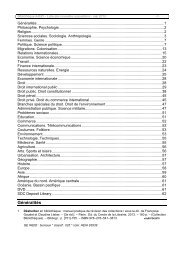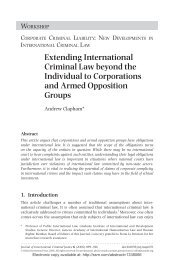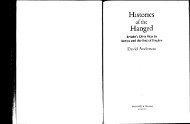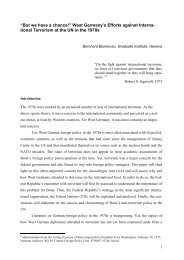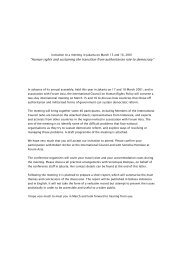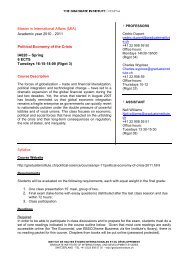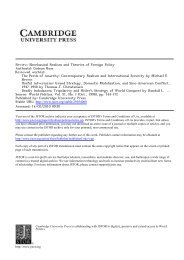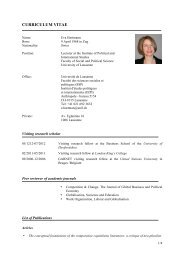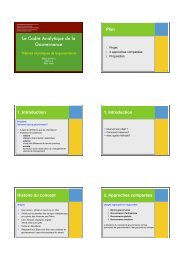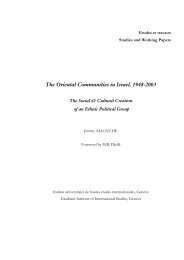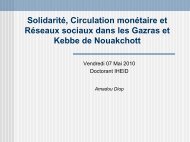Download [pdf] - The Graduate Institute, Geneva
Download [pdf] - The Graduate Institute, Geneva
Download [pdf] - The Graduate Institute, Geneva
Create successful ePaper yourself
Turn your PDF publications into a flip-book with our unique Google optimized e-Paper software.
INTERVIEW<br />
MARTIN RIESEBRODT<br />
Adjunct Professor, Yves Oltramare Chair<br />
Could you describe your path from the Max Weber<br />
Archives in Munich to the University of Chicago<br />
Sociology Department and Divinity School?<br />
After my appointment at the new Max Weber Edition had<br />
ended in 1981, I received a John F. Kennedy Fellowship at<br />
Harvard. Instead of doing what I was supposed to do, I<br />
analysed Protestant fundamentalist programmes on TV.<br />
Since hardly any academic at Harvard or in Germany took<br />
the emerging fundamentalism seriously, I became an instant<br />
expert and later wrote my habilitation on a comparison<br />
between Protestant fundamentalism in the US and Shiite<br />
fundamentalism in Iran. Based on this study, I received an<br />
offer from Chicago in 1990, which I happily accepted.<br />
What attracted you to the <strong>Graduate</strong> <strong>Institute</strong> and<br />
motivated you to take up the Oltramare Chair?<br />
After meetings with Yves Oltramare, Philippe Burrin, Director<br />
of the <strong>Institute</strong>, faculty and students, I was convinced that<br />
this is an excellent institution. I like the cosmopolitan<br />
profile of the <strong>Institute</strong>, its programmes, faculty, and<br />
students, which will be beautifully captured by the new<br />
campus with its splendid architecture. Last but not<br />
least, I am committed to the ideas informing the<br />
Anthropology and Sociology of Development Department<br />
(ANSO). I always regarded the separation of anthropology<br />
and sociology as an awkward heritage of colonial<br />
thinking. And in my view, pluralistic theorising is the<br />
best training for students. It protects them from naïve<br />
technocratic thinking by enabling them to better understand<br />
that “problems” and “solutions” can be defined<br />
from various social locations and perspectives.<br />
What courses and conferences do you plan<br />
to organise here in the coming years?<br />
This spring, I will offer a class on secularisation theories<br />
and the need to revise them. For the conferences,<br />
I plan to address issues like the freedom of speech,<br />
intentional provocation of religious sensibilities, and<br />
the organisation of outrage; tensions between the freedom<br />
of religion and human rights, or between religious<br />
pluralism and social integration.<br />
How do you explain the current dynamics towards<br />
an increasing intertwining of religion and politics,<br />
for example, in the USA, in the Middle East<br />
and in South-East Asia?<br />
<strong>The</strong> re-politicisation of religions seems to be at least<br />
partially provoked by the deficiencies of nation states<br />
in an age of globalisation. If the state is no longer<br />
ad equately responding to expectations of solidarity and<br />
social justice, other principles of association will<br />
substitute.<br />
Could you share with us some of your insights into<br />
the competing fundamentalisms that seem to<br />
characterise the world today?<br />
Of course, there are the fundamentalisms in various religious<br />
traditions we all like to hate. But we should not forget<br />
that many of them emerged in opposition to occasionally<br />
rather aggressive forms of secularism or extreme forms of<br />
economic liberalism. In order to find pragmatic solutions<br />
people can accept, we all have to overcome rigid ideological<br />
positions, be they religious or secular.<br />
Martin Riesebrodt.<br />
Professor Martin Riesebrodt will deliver the Inaugural Lecture of the Yves Oltramare Chair<br />
“Religion and Politics in the Contemporary World” on Thursday 28 February, 6:30 p.m., Auditorium Jacques-Freymond<br />
≥<br />
LA REVUE DE L’INSTITUT I THE GRADUATE INSTITUTE REVIEW I GLOBE I N11 Printemps I Spring 2013<br />
23


![Download [pdf] - The Graduate Institute, Geneva](https://img.yumpu.com/23370020/24/500x640/download-pdf-the-graduate-institute-geneva.jpg)
